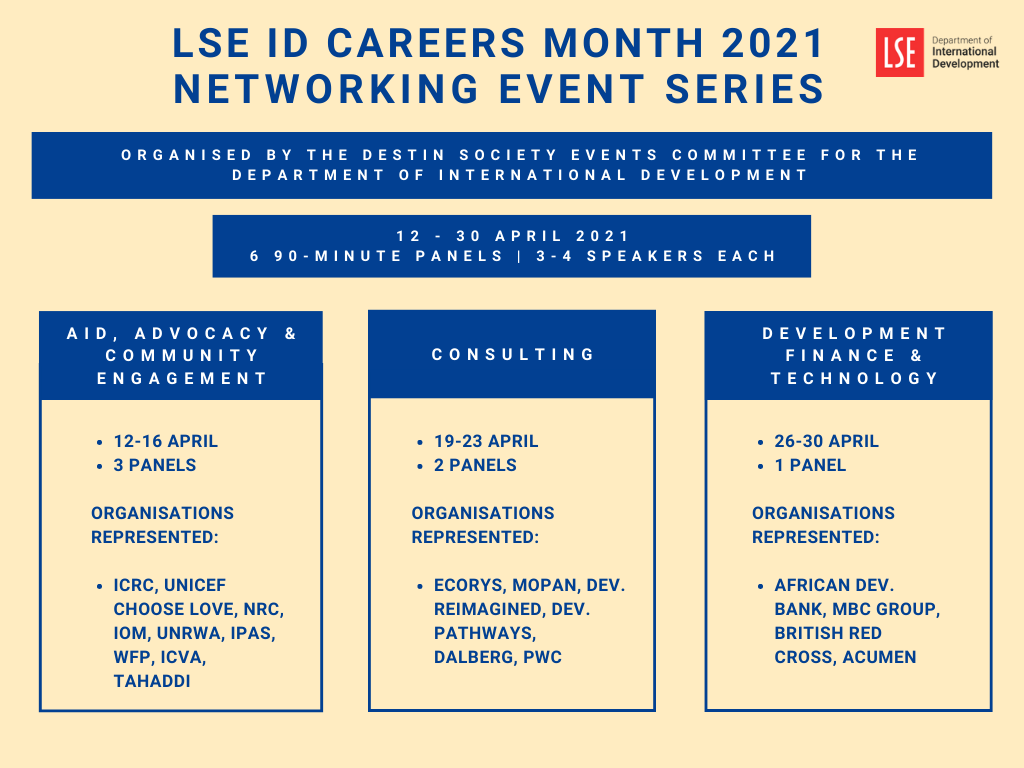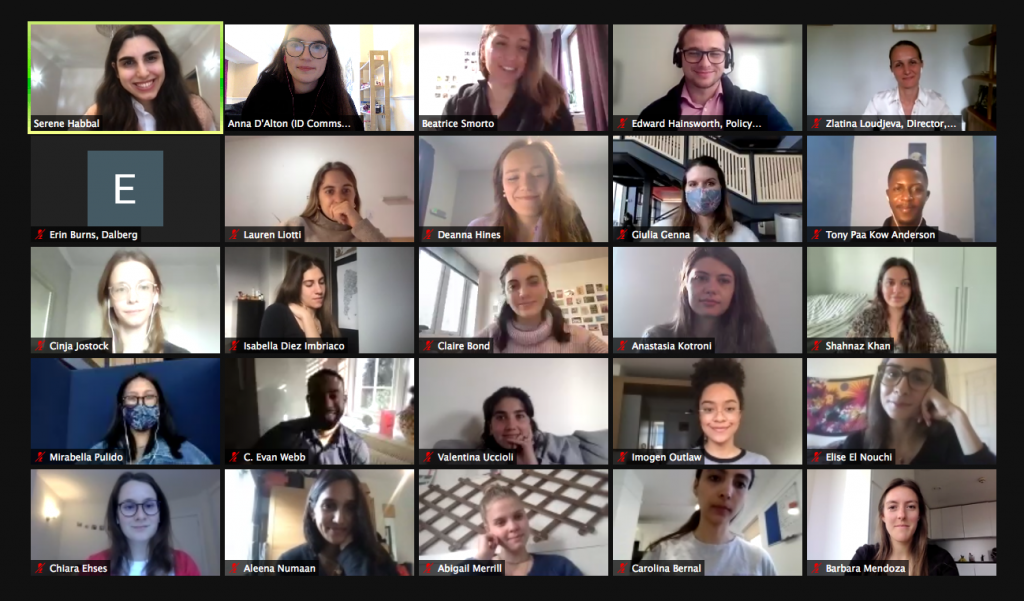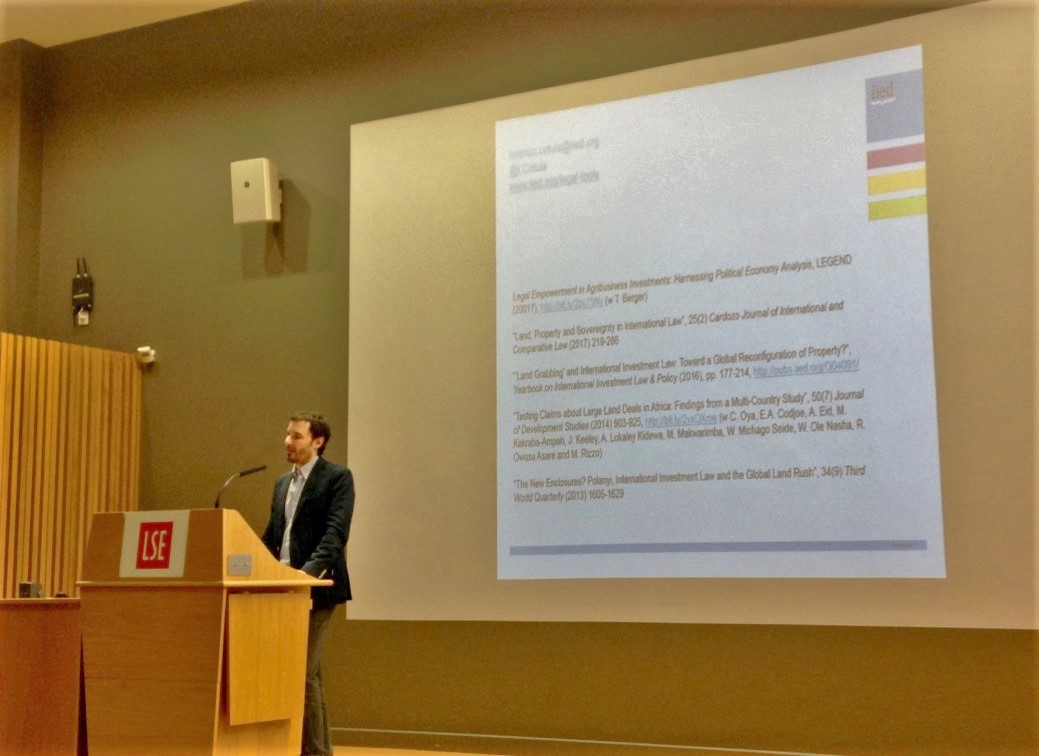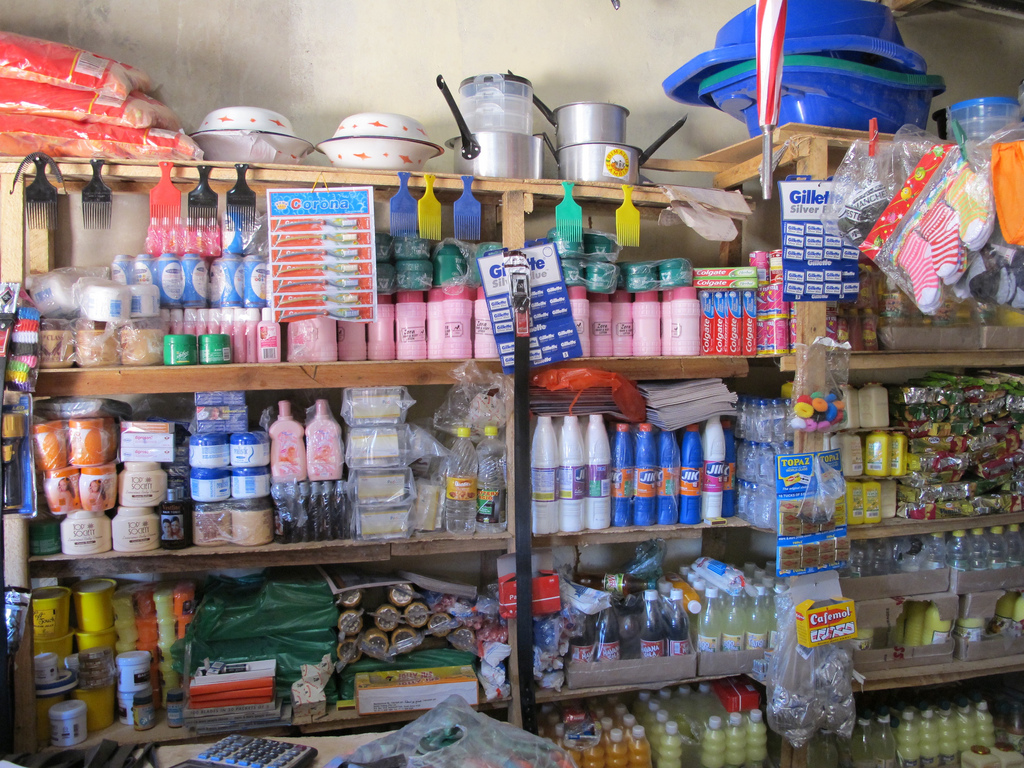For ID Careers Month (12-30 April 2021), DESTIN Society organised a series of six virtual career networking events where students in the department had the chance to hear from professionals working in different areas of the Development sector. MSc Development Management student and DESTIN Society committee member Serene Habbal writes about her experience organising and attending the networking events and compiles a list of the top pieces of advice shared during the sessions.
As my time as a master’s student is almost over, my mind wonders about the future and what my next step will be. Most importantly, how will I manage to shape a career that I want for myself? There is a general panic in the hearts of most ID MSc students about the futures and our next step after LSE. Managing this newfound stress has resulted in varying coping mechanisms. Some have resorted to applying to any opportunity that crosses their path, while others booked hundreds of sessions with the LSE career mentors. With an ongoing pandemic, lack of development funding, and slow recruitment, the future does seem scary.
As a member of the DESTIN society, we decided to support our fellow classmates (and ourselves) by organizing a series of career networking events. As a team, we reached out to LSE alumni working in the development field and leveraged our personal connections to see if we could find willing panelists for the networking sessions. We were met with enthusiasm from alumni and development professionals, who wanted to help guide students into the (often confusing) development job market.
 As we finalized the agenda, we had quite an impressive lineup of panelist spanning Humanitarian and Emergency response, Development management and consulting, and developmental finance sectors. Also, one of the upsides hosting events during a pandemic is the ability to bring in people from all over the world. We had panelists We have invited speakers from a range of organisations including IOM, PwC, Ipas, WFP, UNICEF, Dalberg, ICRC, Ecorys, AfDB and many more, based in 16 countries including Ivory Coast, Pakistan, France, UAE, Belgium, Jordan, Ethiopia, Palestine, and Germany. Over 220 students signed up for the panels within a few days of opening registration and most sessions had reached full capacity before the day of the actual event.
As we finalized the agenda, we had quite an impressive lineup of panelist spanning Humanitarian and Emergency response, Development management and consulting, and developmental finance sectors. Also, one of the upsides hosting events during a pandemic is the ability to bring in people from all over the world. We had panelists We have invited speakers from a range of organisations including IOM, PwC, Ipas, WFP, UNICEF, Dalberg, ICRC, Ecorys, AfDB and many more, based in 16 countries including Ivory Coast, Pakistan, France, UAE, Belgium, Jordan, Ethiopia, Palestine, and Germany. Over 220 students signed up for the panels within a few days of opening registration and most sessions had reached full capacity before the day of the actual event.

As I attended (almost) every event, I noticed that there were recurring themes throughout the sessions. So, here is my list of takeaways from the networking events:
- Reach out, network, and connect! The more you reach out and talk to people in the field, the more likely you will find opportunities you’re looking for. Don’t be scared to send an e-mail, drop a LinkedIn message, and talk to people outside of your social circle. A lot of the panelists had found their current roles by networking with people both online and offline (pre-Covid).
- You need to be a researcher. Research in terms of having knowledge about the field you are interested in. Know the current debates and understand the different approaches towards the topic. Approach everything with newfound curiosity so you can speak confidently about your area of interest.
- Field work can open doors for starting your career. As many students asked the speakers about getting opportunities at the headquarters of big organizations, most advised starting at the field level, which gives you hands-on experience.
- All your past experiences can be linked to whatever opportunity you’re applying to. It’s about creating your own career narrative that aligns with what you’re interested in pursuing. This came as a reassurance for people with experience outside of the development sector. However, this also came with a warning, you need to make sure you excel in talking about your own experiences to highlight your relevant knowledge and skills.
- Be a content creator! The online world gives you an opportunity to share your experiences and learnings via blogs and social media platforms. Make sure you engage with current events that are relevant to your area of interest. This will drive people to towards your profile and allows you to engage with people within the sector.
- Your dissertation could get you a job. One of the speakers shared her own story of getting an opportunity with the World Bank based on her dissertation research. Dissertations can be a golden opportunity to give you research experience in a field you’re interested in. Choose your topic wisely – you never know what opportunity it can get you.
- This field needs creativity, so make sure you sharpen your creativity skills. I was a bit surprised when several panelists said this was a necessary skill in their jobs. The development field needs people who think outside of the box and can come up with new ways of solving old problems.
- Make your applications specific; recruiters can see right through an application that has been sent to hundreds of companies. You need to know who you are applying for and make it clear in your application.
The views expressed in this post are those of the author and in no way reflect those of the International Development LSE blog or the London School of Economics and Political Science.






1 Comments